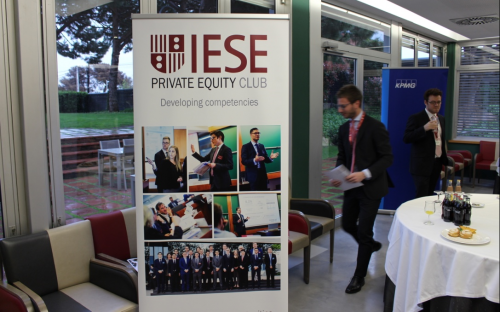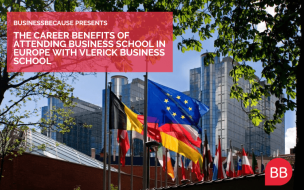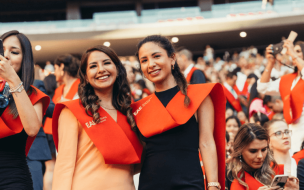The MBAs won €2,000 from the event’s sponsor, the professional services firm KPMG, after impressing judges, including from Spanish lender CaixaBank, and private equity firms Tramway Capital and Black Toro Capital.
“It was one of the highlights of the MBA,” says Rita Calvão, a first-year IESE MBA who was part of the winning team, and who is trying to bridge the gap between her legal background with private equity, venture capital, or entrepreneurship.
João Diogo Stoffel, president of IESE’s student-run Private Equity Club, which organized the competition, with help from career services, says the event provided a unique opportunity.
“They were simulating a real-life deal,” João says. “There’s no other competition like this.”
It also provided the chance for the MBAs to cosy up with representatives from top private equity firms, he believes. “There were students having interviews with the judges’ firms, although it’s not a direct path to a job. [But] you get good connections,” he says.
The IPEC, now in its sixth year, is a competition that simulates a real-life private equity transaction. Teams from different top MBA schools have the opportunity to assume the role of an investment team in an LBO transaction and to negotiate with judges from the private equity and banking industries.
The competition is divided into two rounds: the internal round and the final round. In the internal round, each school selects the best team to represent them. In the final round, during the morning, the teams have to negotiate with three judge committees representing the management of the target company; the lenders of the deal; and the members of the private equity firm’s investment committee.
During the afternoon, after integrating the feedback provided in the negotiation rounds, the teams present their final investment proposal in front of all the judges.
IESE’s success in IPEC caps a robust season for competitions. “There is a wildfire of competitions right now,” says Fabian Roobeek, a first-year IESE MBA. Companies value the insight that MBAs provide. “They do this based on real business problems they have,” Fabian says.
He was flown by Morgan Stanley, the US investment bank, to Hong Kong for its sustainable investment competition. A total of 341 students from 64 schools, among them Harvard Business School and Kellogg School of Management, in 21 countries submitted prospectuses for the 2016 challenge.
Fabian’s team came third overall. The IESE MBAs devised a fund, Clean Capital, to leverage waste in slums in Sub-Saharan Africa to power positive social change.
“They [Morgan Stanley] were looking for alternative investments that deliver a social impact as well as financial returns,” he says.
Meanwhile, IESE also came first in the Roland Berger case competition, which began at the business school in 1995 and has become an anticipated annual event.
Participants chosen to represent their schools had the unique opportunity to work towards a business solution on a relevant and current case study — an exercise which simulates the reality of a consulting career.
RECAPTHA :
14
48
a4
d2








